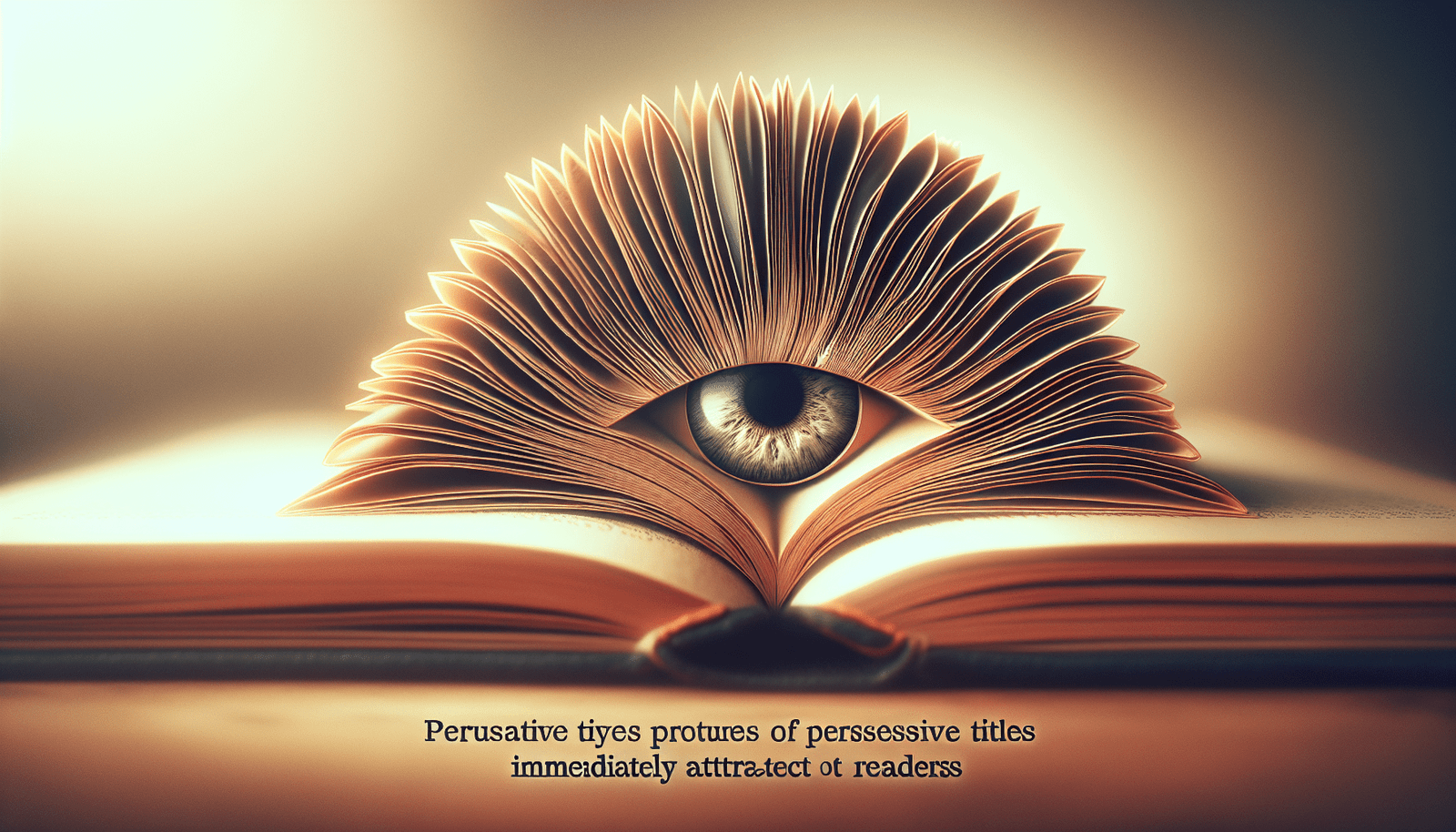What Are the secrets behind Viral Book Titles That Captivated Millions? In this engaging exploration, you’ll uncover the magic ingredients that make book titles irresistible and shareable. From the clever use of keywords to tapping into the emotions of readers, you’ll learn how successful authors craft titles that not only grab attention but also stay in the minds of millions. Whether you’re an aspiring author or a curious reader, this article will guide you through the secrets of creating titles that demand to be read. Get ready to dive into the world of viral book titles and discover what makes them stick!
Have you ever picked up a book solely because its title intrigued you? If so, you’re definitely not alone! The art of crafting a viral book title is akin to alchemy – it’s the perfect blend of curiosity, emotion, and promise that captures the reader’s imagination. Let’s uncover the secrets behind those mesmerizing book titles that have captivated millions and become household names.
Understanding the Power of a Title
Why Titles Matter
A book title is often the first interaction a reader has with your work. Just like a great first impression, a compelling title grabs attention and encourages potential readers to explore further. Think of it as the key that unlocks the door to your story, inviting readers inside.
Psychological Triggers
Human psychology plays a significant role in what makes a title stick. Certain words and phrases can trigger emotional responses, memories, or even curiosity. Leveraging these psychological triggers in your title can make it irresistible.
The Magic Behind Bestsellers
Examining the titles of bestsellers can offer valuable insights. These titles often share common elements or formulas that make them appealing to a broad audience. Learning from these can guide you in crafting your own viral title.
Key Elements of a Captivating Title
Simplicity and Clarity
Clear and straightforward titles often work wonders. They are easy to remember and pronounce, and they tell the reader exactly what to expect.
Example:
| Compelling | Less Compelling |
|---|---|
| The Silent Patient | A Quiet Healer |
| Big Little Lies | Deceptive Little Secrets |
Emotional Appeal
Titles that evoke strong emotions can create a connection with potential readers. Words like ‘love,’ ‘fear,’ ‘danger,’ or ‘hope’ can stir emotions and make the title more memorable.
Example:
| Emotional Appeal | Less Emotional Impact |
|---|---|
| The Fault in Our Stars | A Tragic Tale |
| Gone Girl | Disappeared Woman |
Intrigue and Curiosity
Your title should make readers curious to know more. By hinting at a mystery or posing a question, you entice the reader to pick up the book to uncover the answers.
Example:
| Intriguing | Bland |
|---|---|
| Where the Crawdads Sing | Birds in the Marshes |
| The Girl on the Train | Woman on a Commute |
Promise of a Benefit
Readers often look for books that offer some form of benefit, whether it’s knowledge, inspiration, or entertainment. Titles that promise a clear benefit can compel readers to choose your book over others.
Example:
| Benefit-Promising | Vague or Abstract |
|---|---|
| How to Win Friends and Influence People | Social Tips |
| The 7 Habits of Highly Effective People | Being Better |
The Process of Crafting a Viral Title
Brainstorming Sessions
Effective brainstorming can set the stage for the perfect title. Gather a group of trusted friends or colleagues and throw out as many ideas as possible without judgment. Quantity often leads to quality.
Testing Your Title
Before finalizing a title, test it on a sample audience. Use social media polls, A/B testing, or focus groups to gauge reactions. Feedback can help you refine and perfect your title.
Analyzing Market Trends
Pay attention to current trends in your genre. What types of titles are gaining traction? While it’s important to be unique, aligning with trends can give your title an edge.
Case Studies: Viral Titles That Worked
“The Da Vinci Code” by Dan Brown
Why it Worked: The title evokes mystery and historical intrigue. It promises an intellectual adventure, combining a famous name with an enigmatic element.
“Eat, Pray, Love” by Elizabeth Gilbert
Why it Worked: This title is simple, rhythmic, and emotionally appealing. It hints at a transformative journey and touches on universal themes of nourishment, spirituality, and love.
“To Kill a Mockingbird” by Harper Lee
Why it Worked: The title piques curiosity and has a poetic quality. It hints at innocence and morality, central themes within the book.
“The Hunger Games” by Suzanne Collins
Why it Worked: This title is direct and leaves readers with a thrilling anticipation. It promises excitement and high stakes, which aligns perfectly with the book’s content.
Crafting Titles for Different Genres
Fiction
Fiction titles should encapsulate the essence of the story while evoking curiosity. They often play with metaphors, emotions, or conflict.
Example:
“The Night Circus” by Erin Morgenstern
Why it works: It hints at magic and mystery, central elements of the story.
Non-Fiction
Non-fiction titles benefit from clarity and a clear benefit. Readers want to know exactly what they will gain from the book.
Example:
“Atomic Habits: An Easy & Proven Way to Build Good Habits & Break Bad Ones” by James Clear
Why it works: The title clearly states the benefit and uses the powerful, accessible concept of ‘atomic’ habits.
Romance
Romance titles often focus on the promise of love, connection, and emotional highs. They may include evocative or lyrical language.
Example:
“Me Before You” by Jojo Moyes
Why it works: It highlights a relationship dynamic and promises an emotional journey.
Mystery/Thriller
These titles should make the reader’s heart race. They often include elements of suspense, danger, or a puzzle to be solved.
Example:
“Before I Go to Sleep” by S.J. Watson
Why it works: It immediately raises questions and hints at suspense, drawing the reader in.
Sci-Fi and Fantasy
Titles in these genres often incorporate elements of otherworldliness, adventure, or epic battles. They should transport the reader to another realm.
Example:
“Dune” by Frank Herbert
Why it works: It’s simple yet evocative, hinting at a vast, sandy world full of mystery and intrigue.
Common Pitfalls to Avoid
Overcomplicating the Title
Complex titles can confuse readers. Aim for clarity and brevity. A complicated title may also be hard to remember or repeat.
Being Too Vague
While mystery can be beneficial, being too vague might fail to attract readers. Ensure your title gives enough information to tantalize and engage your audience.
Copying Trends Too Closely
While it’s good to be aware of trends, copying them too closely can make your title feel unoriginal. Strive to blend trend awareness with a unique twist.
The Role of Subtitles
Enhancing Clarity
Especially important in non-fiction, subtitles can help clarify the book’s content and appeal. They provide additional information that might not fit into the main title.
Example:
“Educated: A Memoir” by Tara Westover
Why it works: The main title is intriguing, while the subtitle clarifies the genre and gives context.
Adding Keywords for SEO
Subtitles can also help with search engine optimization (SEO). Incorporating keywords can make your book more discoverable online, especially in digital marketplaces.
Conclusion: The Perfect Blend
Creating a viral book title is both an art and a science. It requires an understanding of psychological triggers, a grasp of market trends, and a flair for creativity. By combining simplicity, emotional appeal, intrigue, and a clear promise, you can craft titles that not only captivate millions but also stands the test of time.
Remember, the title is the cornerstone of your book’s marketing strategy. It can make the difference between a reader walking past your book or picking it up eagerly. So, put on your creative hat, gather some feedback, and test your ideas. Your next viral title could be just around the corner. Happy title crafting!



